Jan 02, 2019, On to Munger
Slow Boat Down the Ganges Update 59

We woke up to the renewed hospitality of the Sharma brothers. It was fogged out outside, and the river ahead was not visible, with visibility down to a few hundred metres. There also did not seem to be any hurry on the side of the brothers to bid us goodbye. A couple of rounds of tea happened, and after morning duties were completed, there was breakfast, complete with local delicacies. Stuff that I would not otherwise consume at home, but here they tasted delicious.
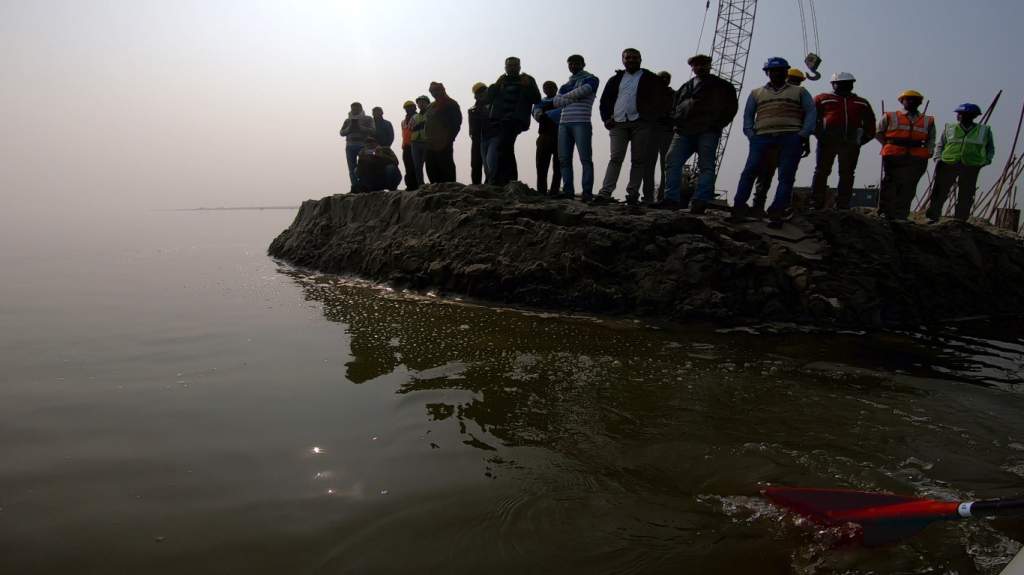
Their hospitality continued even after we were packed, loaded and ready to leave. They not only accompanied us to the spot they suggested was a good place to put the canoe on the water, but also ensured there were enough people to help out in the process. The put-in point was where the brothers are involved in the construction of a new bridge across the Ganges, to replace the existing one which is bursting at its seams. There were multiple people to unload and carry the canoe and equipment from the car to the water’s edge, inflate the boat, put it in the water, hold it in place while I stepped into it and cast off.

There was fog everywhere. The visibility was less than a couple of hundred metres and I could barely see the way forward. Fortunately, the river is wide, though is becoming shallower as the days of the monsoon rains travel farther into the past. I was told that the current is fairly strong and that I could reach Munger, more than sixty clicks away, thanks to the help I would get from the river. The river turned out to be flat, placid and glassy, and I got no help at all from her. However, I was making fairly good time, largely thanks to the new muscles I seem to be developing.
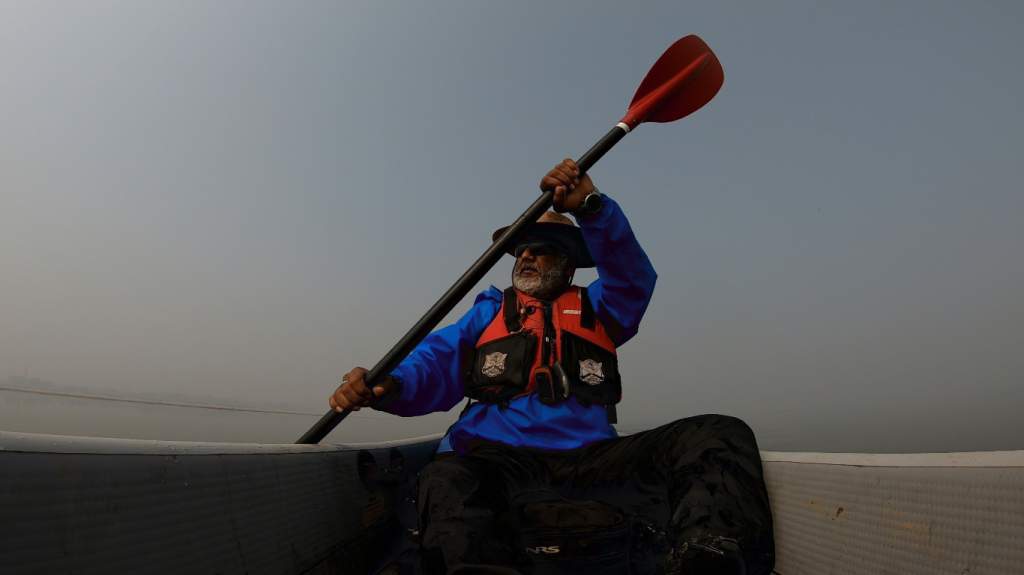
The start today was quite late, a little before eleven in the morning, yet the fog would not have made it possible to launch any earlier. Bihar is notorious for it annual floods and this is something I noticed today. Not the floods, but the fact that I did not see any villages or villagers. In fact, I did not see any fishing boats either. In the entire day I saw maybe half a dozen people, a couple of boats and a few fishermen setting their nets to catch fish. I have become used to being the only one on the river, but not to see any other fishermen on it. This is what was different today.
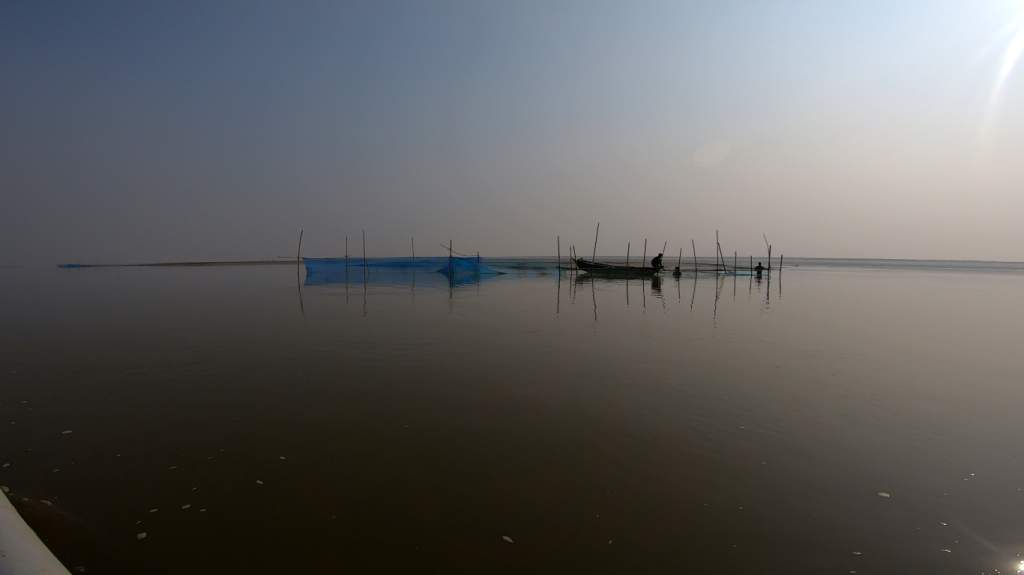
Thanks to the annual floods, not only have the villages moved further inland, but even the roads. Almost all the way to Munger, there is virtually no road where the vehicle and the boat could meet up. If I could not reach Munger by sunset, I would have to camp out. Unfortunately, my tarp was in the vehicle, even though I had my sleeping bag with me. The canoe, as usual, could become my bed. But the falling dew would play havoc with the down sleeping bag, wetting it and making it virtually impossible to dry. This was not looking like an option, and a way had to be found for me to meet up with the car.

Soon enough Chandru called to say that he had found a place, Rasoolpur, where the road was close to the river. In fact the only one he had found after an entire day’s effort. Looking at my GPS and then at my watch, it seemed a distinct possibility that I would only be able to paddle into Rasoolpur way after sunset. I did not want to do that. Moreover, there was no one I was coming across who could guide me to a more convenient location, shorter in distance. I paddled on.
The river then played a nasty trick on me. I came across a sand bar right in front of me. Something I only saw when I came pretty close to it. Squinting through the fog (the fog did not lift all day), I could barely make out a channel far to the right of the sand bar. Not having any other choice, I paddled towards that channel. The sand bar gently sloped into the river and soon enough the bottom of the canoe was scraping sand. I did not get grounded, but the possibility existed. I paddled down the channel to be confronted by yet sand bar. No amount of squinting opened up a channel. This was a dead end. Hmmm.

There was no choice but to retrace upstream, and find another channel that was not a dead end. This time I was happy that the river had zero current. It would have been very difficult to paddle upstream, against a current. I paddled to the spot from where I had gone down the right of the sand bar, found a sliver of an opening through which I could guide the boat. I was back on the main channel.
But I had lost a bit of time, and there was no way I was reaching Rasoolpur. Camping without a tarp was looking like the more likely possibility. I paddled on with some urgency, hoping to reach as close to Rasoolpur as I could. At least two hours hard paddling would reach me there, but it would certainly end in the dark. I did not want to be stranded in the middle of the river in the dark. If I had to camp, I would have to find a camping spot while there was still light.
A couple of kilometres down the river I saw what I thought was smoke. That could mean only one thing ... a funeral pyre. But thanks to the fog, I have been hallucinating all day. I have seen a line of conifer trees, hundreds of feet tall. I have seen visions of electricity pylons in the distance. I have seen fishing boats where there were none. Even now, along with the smoke, I thought I saw electricity pylons. These were on the right bank of the river, while I was paddling down the left bank. Even though the river was shallow at this location, it was quite wide. It took me almost half an hour to reach the right bank. Sure enough, there was smoke. And not only that, I thought I saw the silhouette of a car. Nope, that turned out to be the silhouette of a tree. But I did see a motorcycle. Soon enough I heard voices, before I could make out a bunch of people on the bank. And yes, it was smoke alright.
A sigh of relief escaped my lips. I headed straight to that spot. A couple of people were standing where I beached, and on asking them if there was a road, they answered in the affirmative. This was starting to look good. My second question was whether a car could reach here. Again, they answered in the affirmative. By this time, a crowd had gathered, and I had taken the decision to exfil here, a tiny village called Samho. How to meet up with Chandru would wait for a few minutes longer.

The crowd got very excited, despite a couple of funeral rituals carrying on alongside. Many wanted to take rides on the canoe. I told them that the canoe had to be unloaded first. About twenty people volunteered and the canoe was quickly stripped of its contents while one by one, they took turns at paddling the canoe. And they enjoyed it.
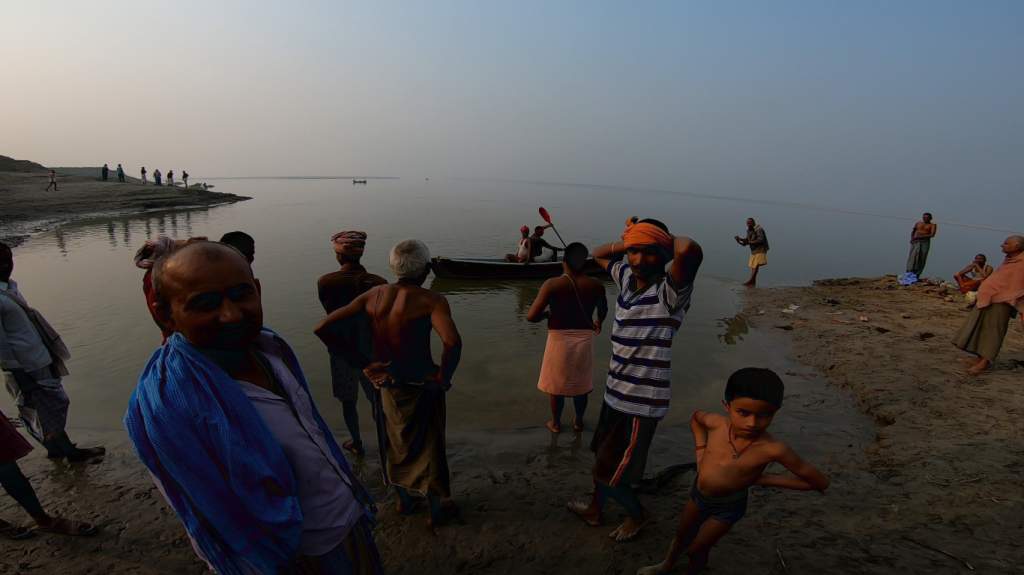
They wondered how I would go from here to wherever I wanted to go. I told them about the car, but they were still perplexed about how the boat would make the journey, if not by the river, since a river is where a boat rightfully belonged. I told them about the inflation and deflation process and they got even more excited. Half a dozen people picked up the boat, carried it to the water and cleaned it up real nice and proper. This was something I had been wanting to do for a couple of days, and here were village volunteers happily performing the task. The clean boat was brought back to shore and they gathered around it, waiting expectantly for me to start the process of deflation. I did that and gasps of awe could be visibly heard. The boat was deflated and folded and when I turned back toward it, I found it on the head of one person who was already carrying it up the steep bank to the road. Others picked up my gear and everything landed up on the trailer of a tractor parked on the road.
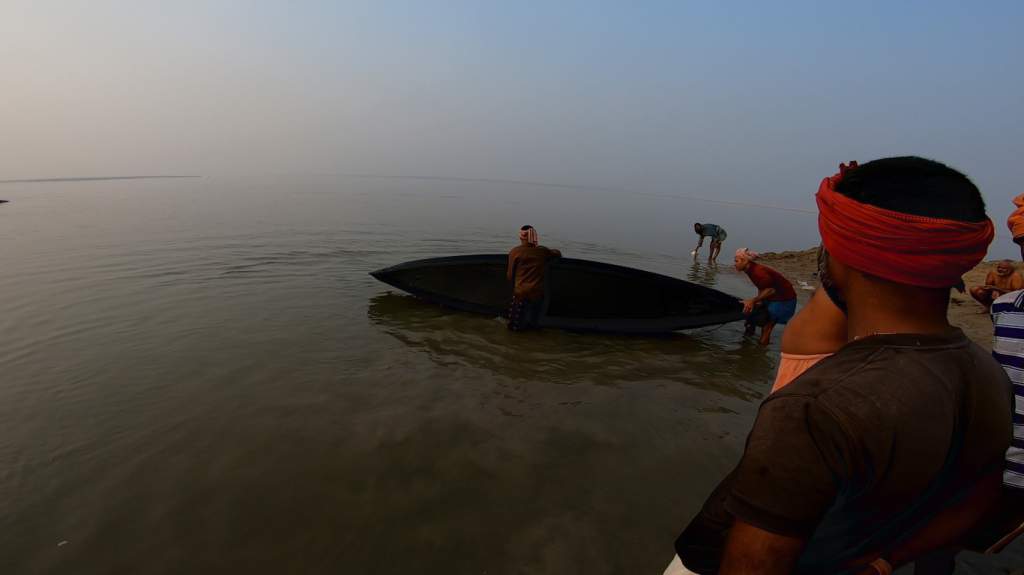
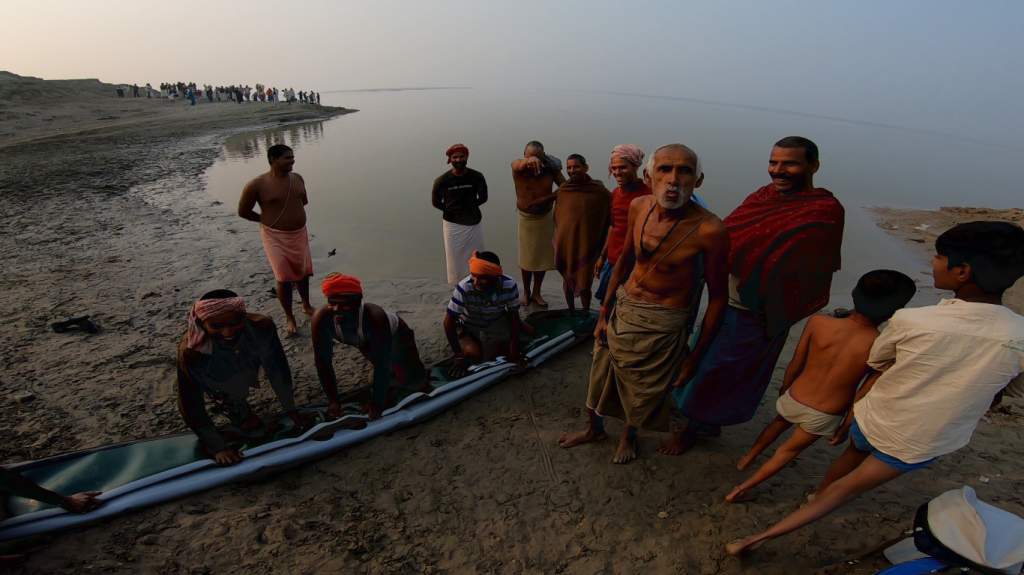
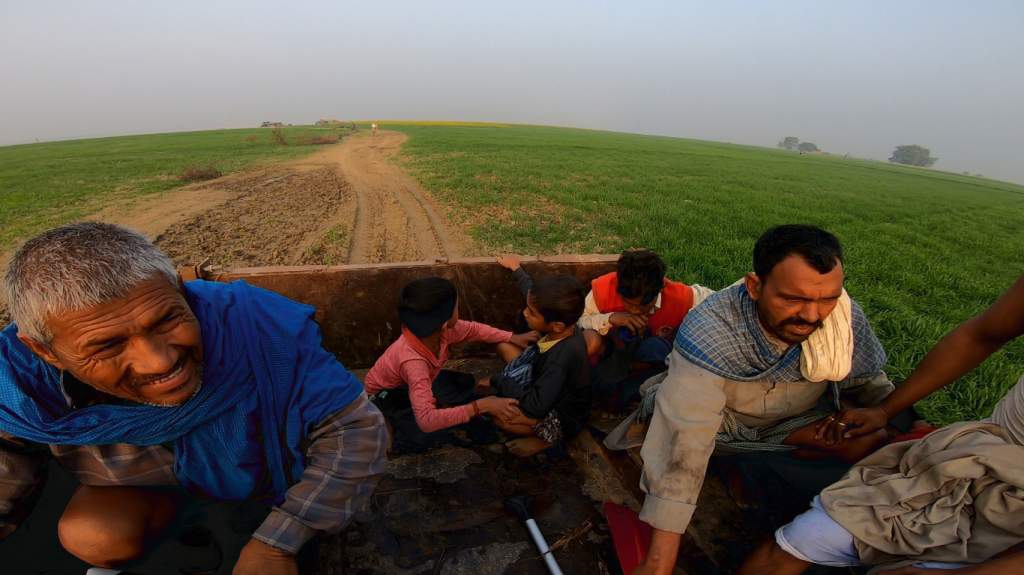
Well, the road is a dirt track, running through agriculture fields. There was no way my poor old Honda City would reach here. Thanks to the villagers, I was getting a ride to the village a few kilometres inland, and I told Chandru to reach the village. As the ride to the village started, I was certain that the car in its attempt to reach the bank, would have certainly part ways with some important pieces of equipment from its undercarriage. The tractor ride itself was nice, bumpy track and all, through fields growing mustard, wheat, etc. A couple of men on horses followed the tractor, and overall everyone was having a jolly good time.
Meanwhile Chandru had reached close to the village and was accosted with a broken bridge. Location was exchanged between us, another local’s help was solicited, Chandru was desperate to find his way to me without any damage to the vehicle, while I landed up at a house and sipped a warm cup of tea. Finally, Chandru arrived and it was time to load up the car and be on our way to Munger. Goodbyes were exchanged, I was more than effusive with my gratitude and thanks and after another few kilometres driving through the fields, with the car grunting every once in a while when the undercarriage hit something, we managed to find our way on to tarmac.
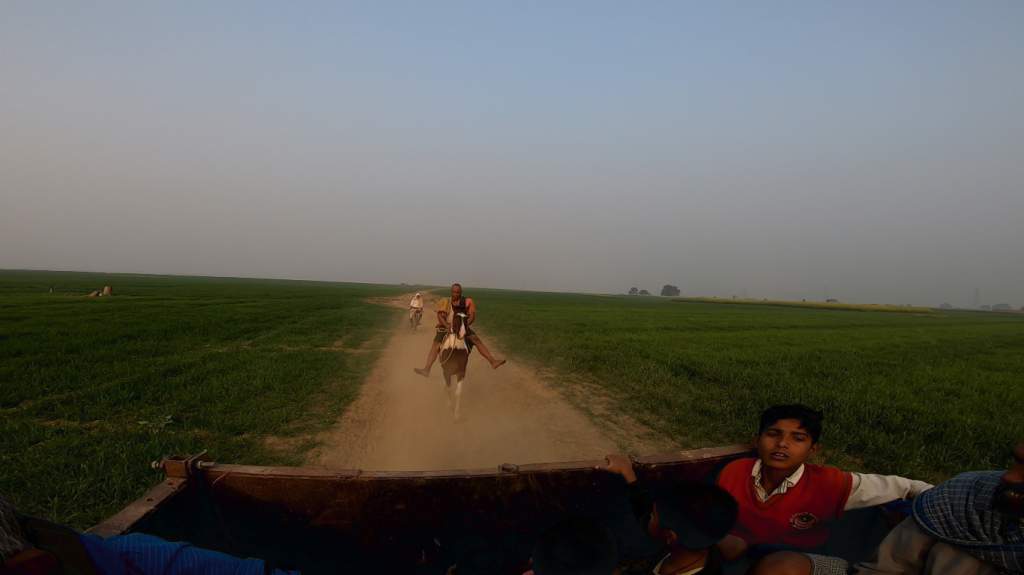
Again, thanks are due to Ravi Shankar Sharma of Mokama. He had called the District Magistrate of Munger, told him of my mission, and requested accommodation at the Circuit House. This was granted and we reached the Circuit House and checked into a wonderfully cosy room. Chandru and Raghu laid claim to the bed, while I had to be as comfortable as I could on the couch. Fatigue ensured that I did not feel any discomfort at all.
By the way, Ravi Sharma has already called ahead to the District Magistrate of Bhagalpur with the same request, and I am certain that we will get to stay at the Circuit House there. Stay has been a roller coaster during this journey. From camping on sandy beaches, to staying in roadside shacks, to sleeping in the homes of village elders, to Army Messes, to Circuit Houses. Life has been very kind thanks to the wonderful people I have been meeting along the way. It has taught me a whole lot of humility, something that I sorely lack.




 (3 votes, average: 5.00 out of 5)
(3 votes, average: 5.00 out of 5)![]() Loading...
Loading...


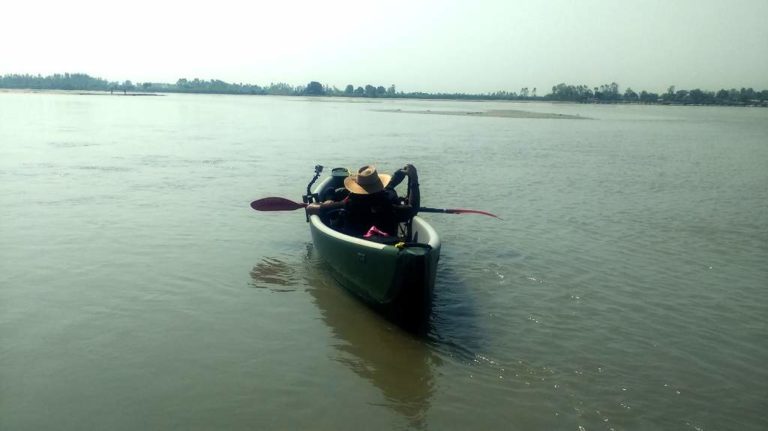



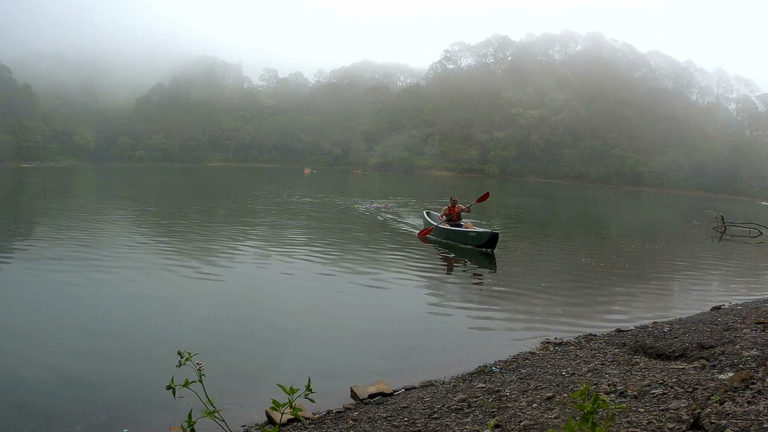
Great writings. Something good for the book.
Fog and Sandbars, well done about finding a passage through.
Great logistics with the Tractor drive, perfect off road tyres. ?
Thanks a lot Alex. I hope the book makes interesting reading for people willing to read it.
Roller coaster it is.
You have to be ready for night out always. I know it’s easy to be writing this sitting inside a warm home.